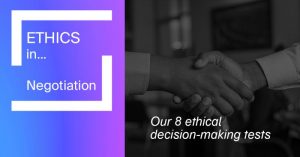When a new leader comes to power, perhaps after a landslide election, or after a long time in opposition, everyone expects change. But managing change and making it sustainable can be tricky. It requires skilful negotiation to build support among the many different stakeholders that will be impacted by the changes.
In this article, we look back to when Emmanuel Macron became president of France in 2017. Even though most of us are not negotiating for change that affects an entire nation, by observing how politicians manage change, we can learn some important lessons that can be applied to everyday negotiations that occur on a smaller scale.
The shock of the new
On 7 May 2017, Emmanuel Macron defeated Marie Le Pen in a landslide to become the French President. After the inauguration came the appointment of the prime minister and government. Representatives to the National Assembly were elected during elections in June, giving Macron less than 6 weeks to forge the political apparatus to support his change agenda.
French political life is strongly marked by criticism, protest and systematic opposition. In 2017, there was a sense that despite the widespread desire for change, too often it had been postponed to better days. Now, it seemed that change was on everyone’s lips and on all political agendas.
Many regarded the new president as talented, determined and energetic – someone with a vision, a project and big ideas. He was seen as a change-maker, but one who was willing to listen with the ability to bring people together. All eyes were on Macron to see if this would be enough.
Making change
The ultimate goal of any negotiation is to reach an agreement. And when you think about it, achieving nation-wide change is also a matter of reaching an agreement, albeit on a scale that affects millions of people.
To prepare for implementing his change agenda, Macron spent the early days of his presidency discovering and enlarging the common ground between the various stakeholders. Common ground can be found in the space where the needs of the different parties overlap. Macron had to take into account people’s expressed needs but also the more personal needs of those who play the complex game of influence.
To ‘co-create’ a common ground that would unite the nation, Macron needed to broaden his support base, appease, reconcile and convince the losers, the opponents and the disappointed. He needed to work out what to offer them so that they would join him and contribute to the renewal of France.
Reaching lasting agreements, whether in the conduct of a country, diplomacy, business or private affairs, means following the same principles of influence and negotiation.
Tips for negotiators
If your goal is to reach a long-lasting agreement with another party, the first step is to identify common ground and expand it. We recommend that you follow a formal process which allows:
- collaboration and establishing a basis of trust
- giving yourself time to listen, explain, understand and explore
- understanding the expressed and hidden needs of other parties
- understanding your own expressed and hidden needs
- identifying and broadening the common ground
- co-creating an ambitious and common objective, a shared direction
- generating new common needs
- carrying them out to widen the common ground again and again
How ENS can help
ENS consultants work with clients all over the world to help them learn how to negotiate effectively by identifying common ground and expanding it. Understanding the expressed and hidden needs of all parties will help you co-create a common goal and lay the groundwork for long-lasting change that all parties can commit to.
Want to know more?
To discuss this article in more depth and explore how you can develop your negotiation capabilities, contact us on the form below.



